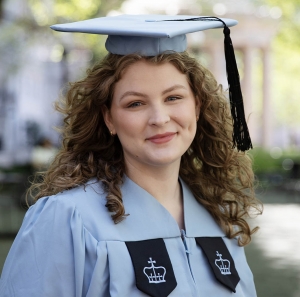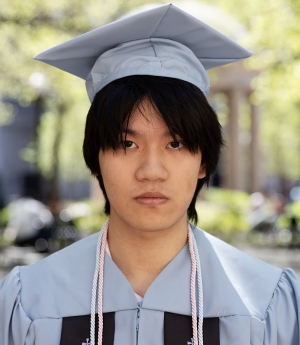The top academic honors for the Columbia College Class of 2025 have been awarded, with Eilidh MacLeod CC’25 being named valedictorian and Suwei Ma CC’25 salutatorian.
MacLeod and Ma were selected by the Committee on Honors, Awards and Prizes based on the strength, breadth, depth and rigor of their academic achievements, as well as their intellectual promise, character and achievement outside the classroom.

EMMA ASHER
MacLeod is a double major in history and climate system science from Evansville, Ind. A John Jay Scholar, she has cultivated her interest in studying human-environment relationships using both historical and scientific methods. MacLeod’s historical research focuses on New Deal flood control policy and changing American relationships with rivers in the early 20th century.
She spent several summers at the Lamont-Doherty Earth Observatory (LDEO), working on a collaborative project with the Native Village of Kotzebue in northwestern Alaska to understand how marine food webs are changing as the Arctic warms. In both disciplines, MacLeod is interested in studying people and the environment using community- and place-based approaches, with an emphasis on the co-production of knowledge between communities and academics.
Taylor Zajicek, a lecturer in history and a Mellon Teaching Fellow in the Harriman Institute, spoke about MacLeod’s work as a double major, highlighting her “near-seamless interdisciplinarity” and how, “in environmental history, Eilidh has found a forum for braiding her talents for language with her experiences of field research.” Zajicek continued: “More impressive, I think, is Eilidh’s eagerness to draft a simplified version of [her] research for general audiences … . This interest in public history and science education suggests a civic spirit that will make Eilidh a treasure for whatever professional, academic and local communities she finds herself in after graduation.”
In addition to her academic work, MacLeod is a dialogue facilitator for Multicultural Affairs and serves on the board of the Barnard Clay Collective, a student ceramics group. After graduation, she will return to her beloved hometown before pursuing graduate education at the intersection of her disciplines.
We spoke to MacLeod about her College experience.
How does it feel to be named valedictorian?
I am absolutely humbled by this honor! I found out while I was in the lab for the course where I’m a TA [teaching assistant], so the professors, other TAs and students found out alongside me. I was in complete shock (and still am!), but that moment of being surrounded by one slice of my academic community captures a lot of how I feel about this. More than anything else, I think this honor is a reflection of all of the hard work and love I’ve had poured into me by my educators. The teachers I had before Columbia and the professors here have given me so much. I wouldn’t be the person I am today without them, so this really belongs to all of them as much as me.
What is your biggest takeaway from your College education?
So much of my Columbia experience has been shrouded in the word “unprecedented,” whether we’re talking about Covid-19 or about the current attacks on higher education and student protest, but my time here has really been about “precedent.” In a way, precedent is the whole point of the Core Curriculum: You engage with the writing and thinking of those who came before you, in situations that are very different, but somehow also extremely similar to the ones we find ourselves in. Through my time at the College, I’ve really internalized the idea that we aren’t alone in the challenges we face and that we can, and must, look to our artistic and intellectual lineage. I’ve found a lot of solace and guidance this way, particularly in thinking about the role of students in our political moment. So, for me, the main message of my time here has essentially been “You are never starting from scratch” — for better and for worse.
What have been some highlights of your Columbia experience?
In the Fall of my junior year, I had the opportunity to travel to Kotzebue, Alaska, as part of a co-production of knowledge project that I’ve been working on with the Native Village of Kotzebue and LDEO researchers. We’re trying to understand how marine food webs are changing as the Arctic warms because lots of people in the community rely heavily on the marine environment as their key source of protein.
I had never been west of Missouri before, so traveling that far was a new experience for me, let alone the fact that Kotzebue is above the Arctic Circle! The area was beautiful, but it was the people who really had a big impact on me. Our collaborators in Kotzebue were incredibly generous and kind, and the experience really underscored my interest in understanding climate change. Most of the scientific work I do is technical — coding and data analysis — but it is always with a community purpose in mind. I am incredibly grateful to everyone on the project for showing me this kind of science and allowing me to be a part of it.
Also, for the last three years, I’ve worked NSOP as a dialogue facilitator for Under1Roof, a program Columbia puts on for first-years to get them thinking about identity and belonging. It’s really exciting and meaningful to see the new students making connections with one another and talking about the issues and identities that have shaped them. It brought me a renewed sense of hope each year as I saw students challenge themselves and come together to form the “Columbia community.” More broadly, Multicultural Affairs has been a space of great learning and community for me, and I couldn’t be more grateful to all of the people in that office, both students and staff.

EMMA ASHER
Ma, a computer science major, was born in China but spent most of his childhood in Canada (in Quebec and then British Columbia), before moving to New York City for high school. He chose the College in part for its Core Curriculum, which allowed him to study a broad range of disciplines outside of his major.
In the Department of Computer Science, Ma was head TA for the discrete mathematics and artificial intelligence courses, in addition to doing research involving large language models and their responses to Markov Decision Processes, supervised by computer science lecturer Tony Dear. Ma’s most recent work builds on a summer project started in the Cyber NYC research experiences for undergraduates program; it explores the employment of LLMs in resolving real-world kernel bugs under the guidance of research groups led by professors Junfeng Yang and Baishakhi Ray.
“From my very close interactions with Suwei over the past three years, I have seen firsthand his excellent capabilities as a student, researcher and teacher,” Dear says. “I can confidently say that Suwei is among the top students that I have ever taught and mentored. The recognition of salutatorian for Suwei is extremely well deserved, and it is a testament to his contributions to the Columbia student body and community.”
Outside of class, Ma enjoys reading, skiing and playing badminton and video games. After graduation, he will intern at Amazon Web Services before beginning a Ph.D. in computer science at Penn, where he will focus on systems and cybersecurity.
We spoke to Ma about his College experience.
How does it feel to be named salutatorian?
Honestly, it’s a bit of a surreal experience. I’m incredibly happy, of course, that my work has been recognized, but I know that many of my friends and peers in CC are far more talented than I am in so many other ways, and all have their own achievements. In a way, it’s even more of an honor considering how fortunate I am to be a part of such a great community.
What is your biggest takeaway from your College education?
Talk to people! Whether it’s professors, classmates or even someone you might only cross paths with once, conversations often open doors you didn’t even know existed, and people will almost always be happy to chat. As someone who’s naturally more introverted, I wish I had realized that earlier. Reaching out, even just a little, made my experience so much richer.
What have been a few highlights of your Columbia experience?
One highlight was being a head TA for discrete math. I loved leading recitations and getting to talk to and work directly with students — it felt like running my own course at times, which was fun.
Another was taking the “Operating Systems” class, which was both the hardest and most rewarding experience I had at Columbia. It demanded countless hours, but through organizing study groups, hosting review sessions and even creating answer keys for unsolved practice problems, I built some of my closest friendships. It was also where I met one of the brightest, most inspiring people I’ve ever known, whom I’ll always remember.